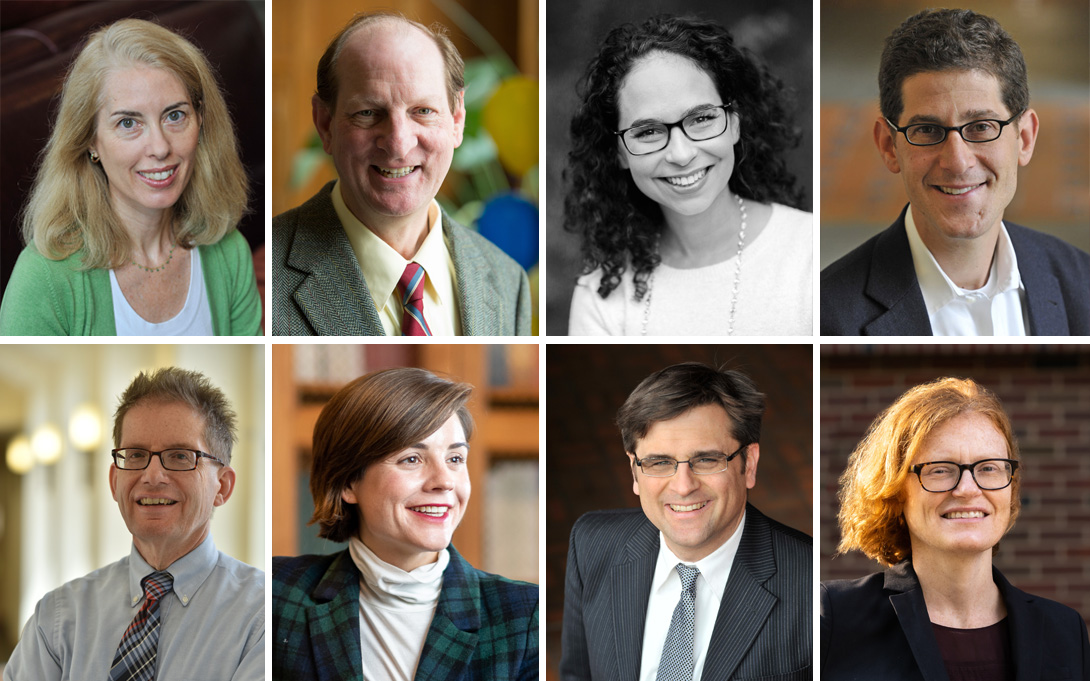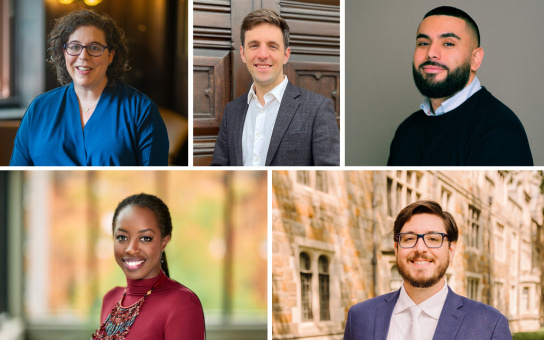
Dominique Adams-Santos, Celeste Watkins-Hayes, and PhD candidate Kayonne Christy contributed a chapter, "Narratives in Context: Locating Racism and Sexism in Black Women's Health Experiences," to The Routledge Companion to Intersectionalities.
The National Academies of Sciences, Engineering, and Medicine appointed John Ayanian to a special committee that will examine the current state of racial and ethnic healthcare disparities in the U.S.
Daedalus published Jenna Bednar's article, "Governance for Human Social Flourishing," in an issue dedicated to work emerging from a five-year project at Stanford University's Center for Advanced Study in the Behavioral Sciences. In November, she was the keynote speaker for the Philosophy, Politics, and Economics Society annual meeting.
Paul Courant and Kevin Stange worked as co-PIs for their project, College and Beyond II (CBII), which is supported by the Mellon Foundation. The project is assembling a massive amount of data to help researchers examine undergraduate education.
Kathryn Dominguez co-authored "Stabilising Financial Markets: Lending and Market Making as a Last Resort," in Reports of the Advisory Scientific Committee for the European Systemic Risk Board and co-wrote a column on the same subject in VoxEu. She was also a visiting scholar at the University of Melbourne Institute: Applied Economic and Social Research.
Ren Farley organized a session about "Census 2020: Its accomplishments, Its deficiencies and Its Consequences for Planning Census 2030" at the Population Association of America Annual Meeting in April. At the same meeting, he presented on the rapidly changing racial composition of the nation, especially the rapid growth of the population who identify with more than one race.
Ben Green joined Harvard University's Berkman Klein Center for Internet & Society for a webinar focused on what fairness means in the context of algorithms and how it can be measured.
Morela Hernandez co-authored "How Women on Boards Navigate the 'Warmth-Competence' Line" in the Harvard Business Review and "How to Help High Achievers Overcome Imposter Syndrome," for the MIT Sloan Management Review.
Rusty Hills urged state attorneys general and local officials to reject lawsuits implicating energy companies in weather-related damages in an op-ed for the National Law Journal.
Brian Jacob and Christina Weiland were both named to the prestigious 2023 RHSU Edu-Scholar Public Influence Rankings. Jacob also published a new working paper about access to career and technical education. Weiland produced new briefs for the Education Policy Initiative, including "What Sustains the Pre-K Boost?," "Michigan Transitional Kindergarten: A First Look at Program Reach and Features," with Jacob, and "Successful Data Collection in Early Childhood Settings During COVID-19."
For Milbank Quarterly, Paula Lantz and Katherine Michelmore coauthored "Abortion policy in the United States: The new legal landscape and its threats to health and socioeconomic well-being." Lantz also co-wrote "The perils of medicalization for population health and health equity" for the Milbank Quarterly.
Earl Lewis led the Inclusive History Project and addressed the scholars who are joining him in critically engaging with the uncomfortable truths of the University of Michigan's history, including entanglements with slavery and racial discrimination.
Mara Ostfeld and former graduate student Nicole Yadon (PhD '20) published a book titled "Skin Color, Power, and Politics in America." Ostfeld and Phd candidate Lydia Wileden co-authored a report titled "Detroiters' Policy Priorities: What Matters to Detroiters Leading Up to the November 2022 Elections."
Natasha Pilkauskas, Brian Jacob, Luke Shaefer, PhD candidate Katherine Richard, and U-M alum Elizabeth Rhodes (MSW '08, PhD '16), published two papers, "The COVID cash transfer study II: The hardship and mental health impacts of an unconditional cash transfer to low-income individuals," in the National Tax Journal and "The COVID cash transfer study: The impacts of a one-time unconditional cash transfer on the well-being of families receiving SNAP in twelve states," in the Journal of Policy Analysis and Management and also a research brief about COVID-19 cash transfers. Pilkauskas and Katherine Michelmore authored "The 2021 Child Tax Credit: Who received it and how did they spend it?".
Barry Rabe wrote about the progress and problems in methane policy in his article, "Methane comes front and center in climate change policy" in Brookings. He presented a paper, "Can Democratic Capitalism Protect the Climate?," for a University of Virginia conference on the future of capitalism and democracy.
Molly Spencer's poetry collection, Invitatory, was selected as a 2022 New Measure Poetry Prize Winner.
Megan Stewart published "Foundations of the Vanguard: the origins of leftist rebel groups" in the European Journal of International Relations. She also received an honorable mention for best book in International Security from the International Security Studies Section of the International Studies Association.
David Thacher penned an essay for Vital City New York, detailing the impact of Mayor Eric Adams's policy on homelessness.
Dean Yang and PhD candidate Alexander Fertig published an article in the Journal of Development Economics about measuring remittances sent home by migrants. Yang also authored a paper for the National Bureau of Economic Research, looking at the mistreatment of migrant workers.
Welcome & congratulations

Kamissa Camara joins the Ford School as a professor of practice. Camara has previously served as Mali's minister of foreign affairs, minister of digital economy and planning, and chief of staff to the president of Mali.
Education economist Sarah Cohodes joins the Ford School as an associate professor. She is an expert in quantitative causal inference methods to evaluate policies and programs that are intended to increase access to high-quality education.
Coming from the Department of Economics at the University of Chicago, Justin Holz joins the Ford School as an assistant professor. His research focuses on how racial discrimination affects minimum wage policies, inequity in property taxes, debt amnesties in developing countries, and the causes and consequences of police misconduct.
Political scientist Devin Judge-Lord joins the Ford School as an assistant professor. Most recently, he was a 2021-2023 postdoctoral fellow at the Harvard University Center for the Environment and Center for American Political Studies. He studies interactions among interest groups, legislators, and bureaucracies, and his recent work focuses on how public pressure campaigns affect agency rulemaking.
Ford School alum Mo Torres (MPP '15) joins the Ford School for a three year appointment as an assistant professor of public policy and sociology and as a University of Michigan Society of Fellows postdoctoral fellow. His research and teaching interests are in political economy, urban sociology, inequality, and the sociology of race.
Robert Axelrod was awarded the 2022 Boris Mints Prize from the Boris Mints Institute in Tel Aviv for his devotion to solving strategic global challenges. Axelrod generously directed the $100,000 prize to the International Policy Center to establish a 2023–24 postdoctoral fellowship on modeling international security.
The U-M recognized Betsey Stevenson with the 2022 Presidential Award for Public Engagement for her demonstrated commitment to public service, contributions to society through national and state leadership, and efforts to address the challenges communities face every day.
More in State & Hill
Below, find the full, formatted spring 2023 edition of State & Hill. Click here to return to the spring 2023 S&H homepage.